b站弹幕的爬取以及词云的简单使用
一.B站弹幕的爬取
1.分析发现,其弹幕都是通过list.so?=cid这个文件加载出来的,所以我们找到这个文件的请求头的请求url,

2. 打开url就能看到所有的评论
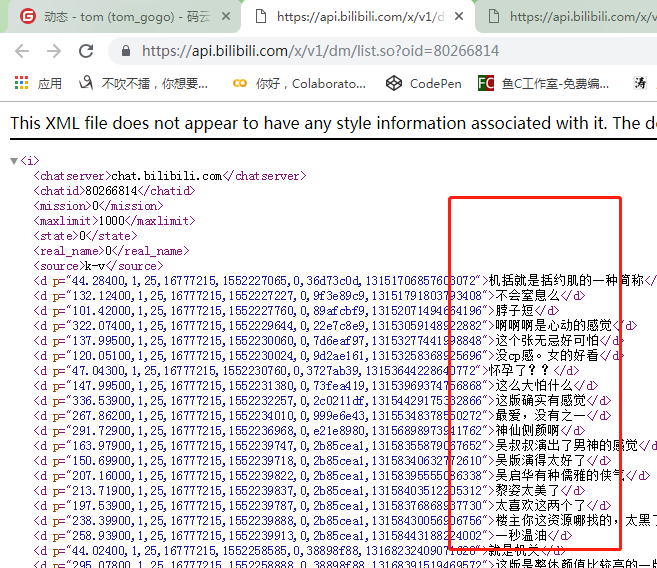
3. 上代码,解析
#!/usr/bin/env python# -*- coding: utf-8 -*-
#author tom import requests from lxml import etree headers={'User-Agent': 'Mozilla/5.0 (Windows NT 6.1; Win64; x64) AppleWebKit/537.36 (KHTML, like Gecko) Chrome/72.0.3626.109 Safari/537.36' } #抓取函数 def yitianSpiderf(url): res=requests.get(url,headers=headers) tree=etree.HTML(res.content) comment_list=tree.xpath('//d/text()') with open('倚天评论.txt','a+',encoding='utf-8') as f: for comment in comment_list: f.write(comment+'\n') #主函数,其实所有是视频找到其id就能抓到所有的弹幕
def main(): cid='80266814' url='https://api.bilibili.com/x/v1/dm/list.so?oid={}'.format(cid) yitianSpiderf(url) if __name__ == '__main__': main()
4.词云:
#!/usr/bin/env python # -*- coding: utf-8 -*- #author tom import re import jieba from collections import Counter #使用结巴分词 with open('倚天评论.txt','r',encoding='utf-8') as f: txt=f.read() jbwords=jieba.cut(txt) #遇到这种非常规词不使用 with open('中文停用词表.txt' ,'r',encoding='utf-8') as f1: stopwords=f1.read() result=[] for word in jbwords: word=re.sub(r'[A-Za-z0-9\!?\%\[\]\,\.~]','',word) #去除英文符号 if word: if word not in stopwords: result.append(word) '+++++++++++++++统计' print('=====',result,len(result)) print(Counter(result)) #制作词云图 import matplotlib.pyplot as plt from wordcloud import WordCloud,ImageColorGenerator from PIL import Image import numpy as np #指定字体,打开图片,转为数组 myfon=r'C:\Windows\Fonts\simkai.ttf' # img1=Image.open('dog.jpg') # graph1=np.array(img1) img2=Image.open('1.png') graph2=np.array(img2) text='/'.join(result) #词语对象 wc=WordCloud(font_path=myfon,background_color='white',max_font_size=50,max_words=500, mask=graph2) wc.generate(text) img_color=ImageColorGenerator(graph2)#从背景图中生成颜色值 plt.imshow(wc.recolor(color_func=img_color)) plt.imshow(wc) plt.axis('off') plt.show()
5. 效果:

二.关于B站直播弹幕的爬取
1. 分析发现,b站直播的弹幕存放在一个名为msg的文件当中
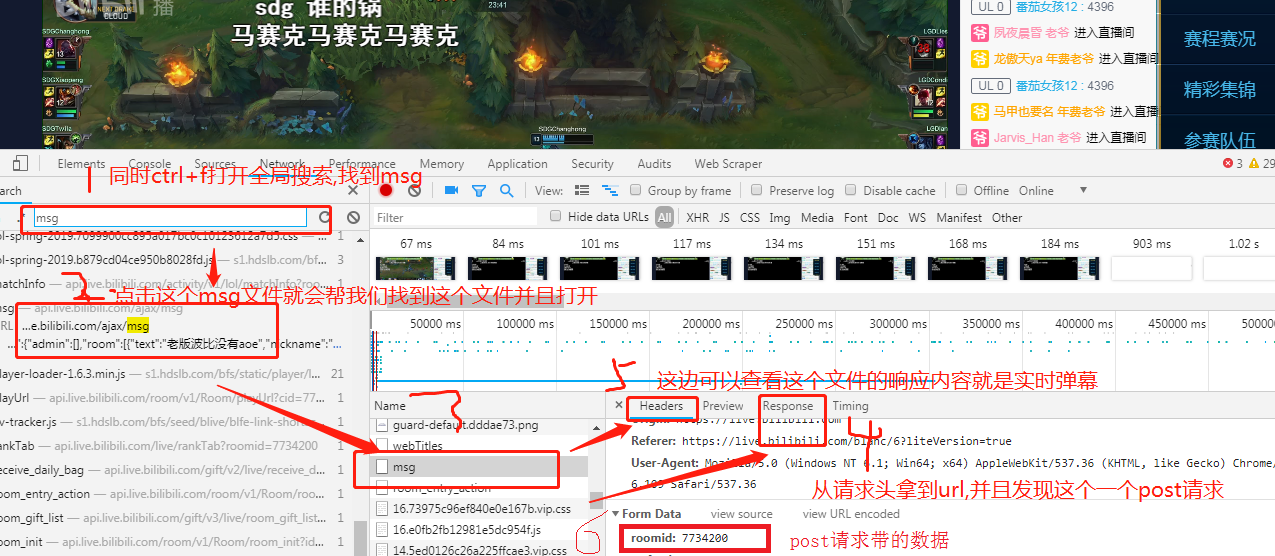
2.我们利用postman对这个网站发起post请求,果然可以拿到数据,
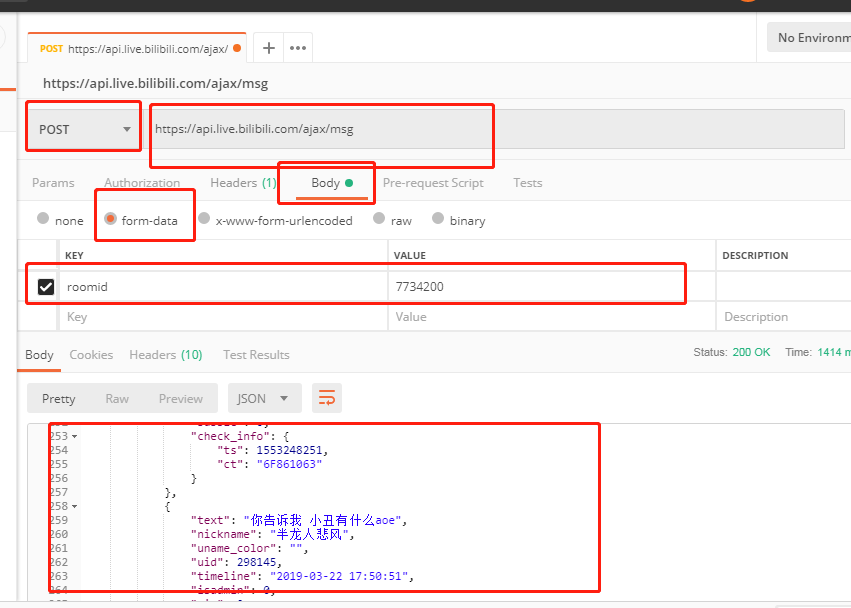
3.代码
#!/usr/bin/env python # -*- coding: utf-8 -*- #author tom import requests import time from jsonpath import jsonpath #抓取函数 def crawl(url,headers,data): res=requests.post(url=url,headers=headers,data=data) #拿到响应,res.json就直接转化成字典格式了,jsonpath要处理的也需要是一个python字典 #jsonpath第一个参数是python字典,第二个参数是匹配规则,这边代表的是从根目录递归搜索text和nicname comment_list=jsonpath(res.json(),'$..text') nicname_list=jsonpath(res.json(),'$..nickname') #同时循环两个列表,需要用到zip打包 for (nicname,comment) in zip(nicname_list,comment_list): dic={ 'nicname':nicname, 'comment':comment } print(dic) def main(): url = 'https://api.live.bilibili.com/ajax/msg' headers = { 'User-Agent': 'Mozilla/5.0 (Windows NT 6.1; Win64; x64) AppleWebKit/537.36 (KHTML, like Gecko) Chrome/72.0.3626.109 Safari/537.36'} data = {'roomid': '7734200'} #使用while循环最好呀睡觉,哪怕0.1也好,否则内存扛不住 while True: crawl(url,headers,data) time.sleep(2) if __name__ == '__main__': main()
三.b站小视频的爬取
需求:爬取b站的小视频
url=url = http://vc.bilibili.com/p/eden/rank#/?tab=全部
1. 分析:打开这个网址我们发现这是一个ajax请求,并且这个请求里面包含了我们要的小视频地址
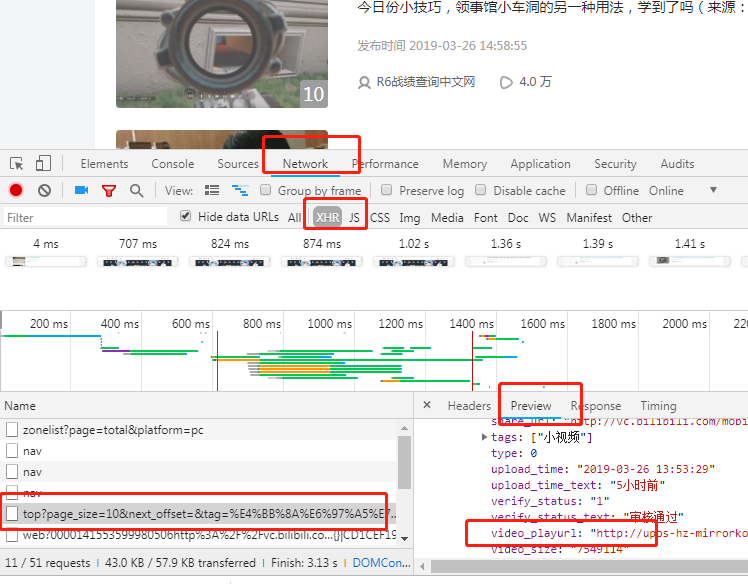
2.对vedio_playurl请求就直接把视频下载下来了

3. 上面的不方便查看,我们就对这个地址发起请求,利用jsonview来帮助查看
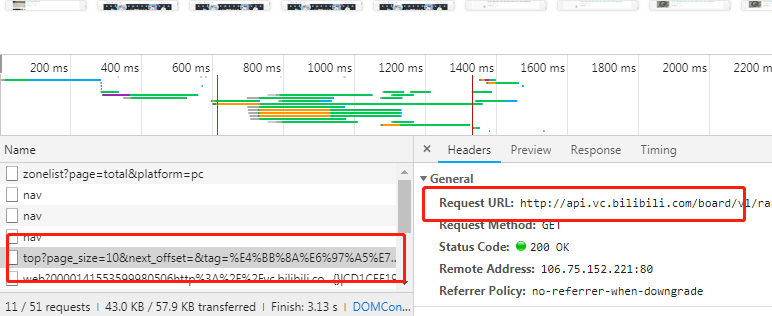
4.看一下请求结果
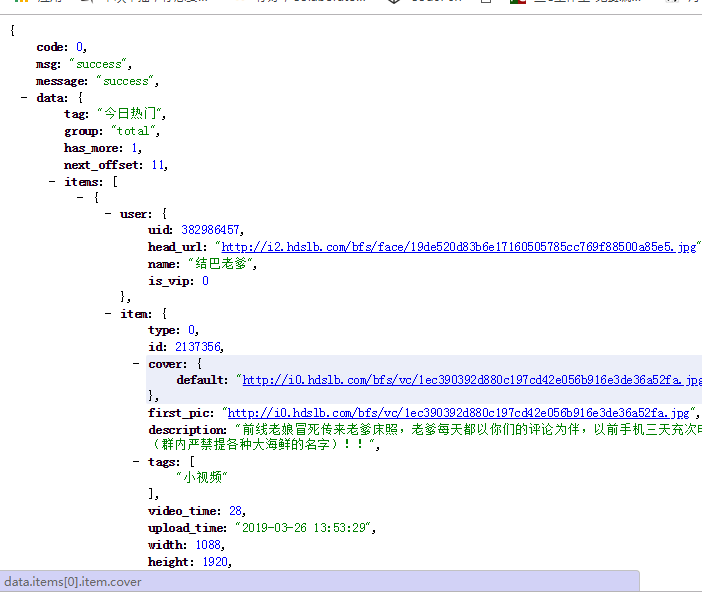
5.对ajax发起跟过请求

可以看到,带着参数就可以拿到欧更多的数据,现在知道怎么抓去了把




【推荐】国内首个AI IDE,深度理解中文开发场景,立即下载体验Trae
【推荐】编程新体验,更懂你的AI,立即体验豆包MarsCode编程助手
【推荐】抖音旗下AI助手豆包,你的智能百科全书,全免费不限次数
【推荐】轻量又高性能的 SSH 工具 IShell:AI 加持,快人一步
· AI与.NET技术实操系列:基于图像分类模型对图像进行分类
· go语言实现终端里的倒计时
· 如何编写易于单元测试的代码
· 10年+ .NET Coder 心语,封装的思维:从隐藏、稳定开始理解其本质意义
· .NET Core 中如何实现缓存的预热?
· 分享一个免费、快速、无限量使用的满血 DeepSeek R1 模型,支持深度思考和联网搜索!
· 25岁的心里话
· 基于 Docker 搭建 FRP 内网穿透开源项目(很简单哒)
· ollama系列01:轻松3步本地部署deepseek,普通电脑可用
· 闲置电脑爆改个人服务器(超详细) #公网映射 #Vmware虚拟网络编辑器